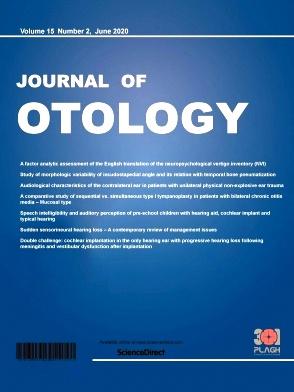探讨盐酸(R)-PFI-2通过靶向NLRP3炎性体和NF-κB通路减轻内耳炎症,减轻噪声性听力损失的疗效。
IF 1.4
Q2 OTORHINOLARYNGOLOGY
引用次数: 0
摘要
噪声性听力损失(NIHL)主要由耳蜗内的炎症过程驱动,其中噪声暴露触发nod样受体蛋白3 (NLRP3)炎性体的激活,导致炎症级联反应。NLRP3表达升高与NF-κB活性的相互作用可进一步放大耳蜗炎症。我们的研究结果表明,SETD7酶的选择性抑制剂(R)-PFI-2 hydrochloride可有效抑制耳蜗NF-κB通路的激活,抑制促炎因子的释放,阻止炎性小体的组装。这种干预破坏了炎症的持续循环,从而减轻了耳蜗毛细胞因声创伤造成的损伤。因此,(R)-PFI-2盐酸盐成为NIHL的有希望的药理学候选药物,靶向并调节与听力损失病理相关的过度免疫和炎症反应。本文章由计算机程序翻译,如有差异,请以英文原文为准。
Exploring the efficacy of (R)-PFI-2 hydrochloride in mitigating noise-induced hearing loss by targeting NLRP3 inflammasome and NF-κB pathway to reduce inner ear inflammation
Noise-induced hearing loss (NIHL) is primarily driven by inflammatory processes within the cochlea, where noise exposure triggers the activation of the NOD-like receptor protein 3 (NLRP3) inflammasome, leading to an inflammatory cascade. The interaction between increased NLRP3 expression and NF-κB activity can further amplify cochlear inflammation. Our findings reveal that (R)-PFI-2 hydrochloride, a selective inhibitor of the SETD7 enzyme, effectively inhibits the activation of the cochlear NF-κB pathway, suppresses the release of pro-inflammatory factors, and prevents inflammasome assembly. This intervention disrupts the perpetuating cycle of inflammation, thereby alleviating damage to cochlear hair cells attributed to acoustic trauma. Consequently, (R)-PFI-2 hydrochloride emerges as a promising pharmacological candidate for NIHL, targeting and moderating the excessive immune and inflammatory responses implicated in the pathology of hearing loss.
求助全文
通过发布文献求助,成功后即可免费获取论文全文。
去求助
来源期刊

Journal of Otology
Medicine-Otorhinolaryngology
CiteScore
2.70
自引率
0.00%
发文量
461
审稿时长
18 days
期刊介绍:
Journal of Otology is an open access, peer-reviewed journal that publishes research findings from disciplines related to both clinical and basic science aspects of auditory and vestibular system and diseases of the ear. This journal welcomes submissions describing original experimental research that may improve our understanding of the mechanisms underlying problems of basic or clinical significance and treatment of patients with disorders of the auditory and vestibular systems. In addition to original papers the journal also offers invited review articles on current topics written by leading experts in the field. The journal is of primary importance for all scientists and practitioners interested in audiology, otology and neurotology, auditory neurosciences and related disciplines. Journal of Otology welcomes contributions from scholars in all countries and regions across the world.
 求助内容:
求助内容: 应助结果提醒方式:
应助结果提醒方式:


